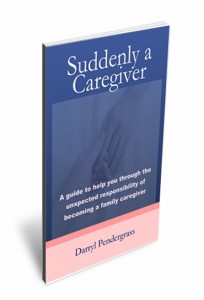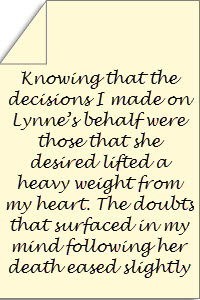This article is part 4 of 4 of the chapter about grief from my soon to be released book – Suddenly a Caregiver. I was the primary family caregiver for my wife who battled brain cancer for nearly four years. The chapter – Grieving – shares the grieving and recovery experience. I hope my experience provides a source of learning for you.
Visit the book page and the Facebook page for book release information. The first 100 people that register will receive a coupon for a free eBook edition upon release.
Read Suddenly a Caregiver – Grieving (Part 1 of 4)
Read Suddenly a Caregiver – Grieving (Part 2 of 4)
Read Suddenly a Caregiver – Grieving (Part 3 of 4)
Despite the preparation the family and I made, there are areas where we could have improved. Our family digital photo albums date back to 2002 with subsequent albums categorized by year. At Lynne’s diagnosis, and through her treatment, the family took about three times the number of photos as in previous years. While photography during an illness may be uncomfortable to some, I am thankful that Lynne was comfortable with the many photos taken of her. One person shared with me that taking photos during the illness, initially seemed  strange but later recognized that the family photographs, captured during that time are now the most cherished of all. At the time, I did not foresee the need to collect photographs from others to combine with the family library, but even as I write, I remember some photographs that I can no longer locate. At the time, I underestimated the importance those photographs would have in the future, for helping the family members with remembering important events. I share this as an encouragement to you to collect those pictures and place them in a safe place. You may not realize just how cherished those photos might become.
strange but later recognized that the family photographs, captured during that time are now the most cherished of all. At the time, I did not foresee the need to collect photographs from others to combine with the family library, but even as I write, I remember some photographs that I can no longer locate. At the time, I underestimated the importance those photographs would have in the future, for helping the family members with remembering important events. I share this as an encouragement to you to collect those pictures and place them in a safe place. You may not realize just how cherished those photos might become.
We captured family videos of the family when the children were young but that decreased over time. I did capture some special moments on video taken while on a cruise with Lynne to Alaska in 2009. I transferred the early videos from tape format to digital format to make sure that my family could enjoy them long into the future. The family benefits in their recovery by remembering the good times captured those videos.
Lynne did leave our family some wonderful memories through her scrapbooking. These books not only contain cherished photos but also have Lynne’s special touches, as she personally created each page. Several family members and friends have commented that the birthday, anniversary, and ‘thinking of you’ cards she made for them, still serve as a fond memory of Lynne’s caring spirit.
Other areas of preparation included collecting favorite recipes for future use. Lynne was a good cook and an exceptional baker. Her recipe collection was extensive, filling several shelves in our home pantry. We neglected to write down some favorite recipes for the family to share. This is just another area that you might consider focusing on, for storing such information for future use and facilitate the remembering of special times.
You might also collect phone messages and voice recordings. My son has a few phone messages from his mom. One in particular is very special to him. She called Josh to wish him a happy birthday. Unable to take her call at that moment, she left him a voice mail, singing to him. I am unaware of other family members who have such voice recordings but recognize that you might value such a memory in the future. Do consider collecting such items while you have the chance.
For some of these tasks, you might consider asking a family member to help. Your role as a caregiver may be time-consuming, so focusing on tasks like photo or recipe collections might not fit your schedule. When family members or friends volunteer to help, I suggest you consider these types of projects. As a caregiver, you can help other people through their grief by allowing them to participate in some meaningful way. I believe our Creator designed our human nature to serve, so providing opportunities to someone to serve not only helps you but also helps others as well.
Other potential steps exist that help to prepare for the burden of loss. Despite all of the good intentions early in life to prepare a living will, neither Lynne nor I had done so. After her initial brain surgery and recovery, we both prepared a living will and health care power of attorney. Preparing the living will to  document Lynne’s advanced directives enabled us to discuss Lynne’s decisions regarding the end of her life. The health care power of attorney allowed me to represent Lynne when she could not make decisions herself. The discussions we had and documenting them for legal purposes helped me significantly during the final week of her life and the weeks following her death. Knowing that the decisions I made on Lynne’s behalf were those that she desired lifted a heavy weight from my heart. The doubts that surfaced in my mind following her death eased slightly, as I knew I was following her desires.
document Lynne’s advanced directives enabled us to discuss Lynne’s decisions regarding the end of her life. The health care power of attorney allowed me to represent Lynne when she could not make decisions herself. The discussions we had and documenting them for legal purposes helped me significantly during the final week of her life and the weeks following her death. Knowing that the decisions I made on Lynne’s behalf were those that she desired lifted a heavy weight from my heart. The doubts that surfaced in my mind following her death eased slightly, as I knew I was following her desires.
In addition, keeping a journal might prove useful during your grief and recovery. Some people incline naturally to keeping journals, while others might struggle with the act of expressing their emotions in writing. For me, writing in the blog and maintaining medical treatment records met only a partial goal of keeping a journal. During the care giving process of one that is seriously ill, difficult situation arise. Sometimes the experience and outcomes of the situation will be better and at other times, worse. I believe some people tend to remember these down times because of the protection mechanisms built within the brain. During the grieving process, a journal containing records of the good times we have experienced helps to serve as a reminder for when we experience the sadness that is a natural part of the grief recovery. Recording the emotions you feel during the caregiving process also allows for reflecting back, and I hope, seeing progress compared to how you felt previously. Observing the progress in your own well-being provides an encouragement in its own right.
The many discussions that Lynne and I shared about death and dying during her illness were paramount to my grief recovery. Family members, who openly communicate about death, tend fare better than families with less open communication (Black, as cited in Carmon, Western, Miller, Pearson, & Fowler, 2010). One reaction to grief is personal growth. This reaction seems most predominant in those that openly communicate about their grief. Other reactions to grief include such things as anger, blame, despair, and panic (Carmon, et al., 2010). The discussions between Lynne and me helped to reduce the uneasiness we held about the dying process. In the final months of her life, I began to sense Lynne’s own internal preparation for that day. My selfish nature desired that she live but she showed signs of exhaustion from the three-year battle. As I reflect on those discussions, they are some of my most treasured and valuable memories.
Another preparatory step includes understanding an employer’s policies and benefits related to taking time off from work to tend to caregiving and bereavement. Knowing these policies ahead of time potentially reduces the number of concerns and worries, when caring for someone. It also helps when the death occurs. I was fortunate to have a very understanding management chain. However, without speaking to them, I would have increased my anxiety about missing work suddenly or adjusting my work schedule, to accommodate the time I needed to care for Lynne. My two immediate supervisors were very wise. Just days following Lynne’s diagnosis, they scheduled a discussion with me about their intended approach to the situation. This eased my mind, as one thought that crossed my mind during the first week of this ordeal was the potential impact on employment and the ramifications that would ensue.
It is impossible to prepare completely or anticipate all of the emotions and other concerns we face during a loss. I believe that preparing and anticipating the loss causes thinking and actions that help to minimize, if only slightly, the grief of the loss. Reminiscing and expressing emotions with family and friends provide effective coping tools after the death. For me and my hope for you is that the hopelessness turns into hope, and the grief turns into joy, as you learn to push forward and reflect on the positive memories and the legacy of the life that was lost.
References
Carmon, A. F., Western, K. J., Miller, A. N., Pearson, J. C., & Fowler, M. R. (2010). Grieving Those We’ve Lost: An Examination of Family Communication Patterns and Grief Reactions. Communication Research Reports, 27(3), 253-262. doi:10.1080/08824096.2010.496329
Please share your comments, thoughts, and suggestions.


